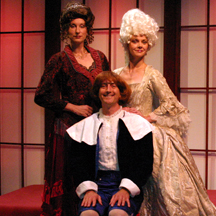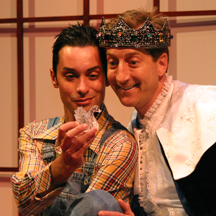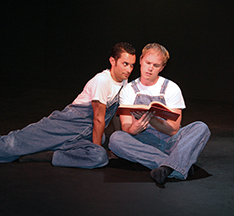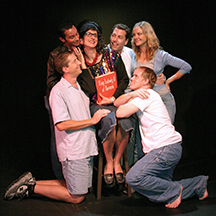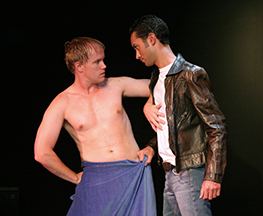Valhalla
September 8 – October 2, 2005
About the Show
Paul Rudnick’s new comedy “Valhalla” will open Diversionary Theatre’s 20th Anniversary Year on September 8. The comic epic, by the author of “Jeffrey” and “In & Out”, will be directed by San Diego and Diversionary favorite Tim Irving.
“Valhalla” intertwines two stories: the life of Ludwig of Bavaria, the 1880’s Mad King responsible for building a series of storybook castles inspired by Wagnerian operas, and the fictional adventures of James Avery, a wild Texas teenager of the 1940s. These two iconoclasts are tracked from childhood through their deaths. The play explores questions of beauty and madness, as both Ludwig and James pursue lives of operatic passion, bringing them in contact with such diverse figures as a high-school quarterback, the prettiest girl in Dainsville, Texas, most of the characters of “Lohengrin,” and princess Sophie, who declares herself “the loneliest humpback in Europe.” “Valhalla” is a comic epic, confronting the price to be paid for wanting, and getting, everything you dream of.
“Valhalla” opened in the spring of 2004 at the New York Theater Workshop. Of that production, the New York Daily News described it as “…full of funny moments.” Time Out said “…a dizzy, brisk diptych that connects 19th-century Bavaria to 1940s Texas in a unified field theory of gayness.” And the Village Voice said “…a juggling act skillful enough to revive vaudeville.”
Creative Team
Playwright: Paul Rudnick
Director: Tom Irving
Design: David Weiner
Lighting: Mia Bane Jacobs
Costumes: Shulamit Nelson
Sound: Mark Bennett
Reviews
San Diego.com
Review by Jennifer Chung
September 15, 2005
“Valhalla” at Diversionary Theatre
Imagine a gleeful Marie Antoinette decked out in “let them eat cake” decadence – foot-tall powdered hair, panniers for that exaggerated hip look – entreating you to turn off your cell phones or else – off with your head!
This zany prelude to Diversionary Theatre’s production of “Valhalla” is a tasty morsel of what’s to follow in Paul Rudnick’s hilarious new play. The production, which opens Diversionary’s 20th anniversary season, features a stellar cast and relentless screwball humor at breakneck speed.
The coming-of-age tale alternates between the lives of King Ludwig II in the late 1800s and James Avery, a Texas teenager in the 1930s. We meet both as 10-year-olds and follow their trajectory through manhood and the difficulties they face as oddball outsiders. What the two characters have in common is an inextinguishable fixation on beauty, a swishy flamboyance and a disdain for the drab, the tacky and the ordinary.
The “mad king of Bavaria” is a daydreaming romantic obsessed with opera, who empties his treasuries to build fabulous rococo castles throughout the country. Andy Collins’ Ludwig is a lovable space-cadet dandy with a carefree attitude.
Angelo D’Agostino is deliciously deviant and charming as James, the kleptomaniac outlaw who shrugs off burning down his parents’ home as “redecorating.” He’s looking for an escape into the wide world – he’s way too much of a bitchy diva to stay in his small, stifling Texas hometown.
Though they never actually meet, their stories are intertwined and overlap at various points. These moments of intersection are stunning orchestrations of high camp, parallel plot lines, layered dialogue, a dual wedding in one instance and a thoroughly fun waltz cum boogie-woogie dance number in another.
Four additional actors – all displaying spot-on physical comedy and outlandish antics – morph into more than a dozen other characters. Laura Bozanich is a laugh riot as both boys’ mothers and especially funny as the Bavarian castle tour guide. Lisel Gorell-Getz is magnificently self-absorbed and smirking as James’ sometime teenaged love interest, and hilarious as a humpbacked princess and the haughty Marie Antoinette. Andrew Kennedy is adorably na?ve as James’ best friend and lover, and Zachary Mikles does well in his multitude of roles.
Much of the credit also goes to director Tim Irving for keeping the pacing swift and the quick scene changes seamless. David Weiner’s set design is simple and effective, using a backlit translucent scrim as a backdrop and utilizing just about the whole theater as the stage.
And let’s face it – we are not immune to the allure of beauty, either. Much of the production’s pleasure is derived from Shulamit Nelson’s lavish costume design, particularly the apparel of Ludwig and his court, and Marie Antoinette’s gown of profligate royalty.
Playwright Rudnick uses James and Ludwig’s parallel yet divergent stories to explore issues of normality, madness, superficiality, fantasy and reality. While Ludwig’s obsession with beauty is ultimately his downfall – “I’m no good at reality but brilliant at everything else” – James gets a sobering dose of reality while on tour of duty in Europe.
“Inner beauty is tricky,” says one character, “because you can’t prove it.” Yet James thinks he can see through to people’s hearts by looking in their eyes – or does he mistake outer beauty for inner character? It’s an error that could cost him dearly.
Though the play lags a bit in the second half due to these more serious musings (and some needless sentimentality), “Valhalla” is mostly wrapped in breathless, over-the-top humor that takes aim at religious zealots, straight people, the trailer park redneck set, the English, verklempt Jewish Long Islanders with big hair, you name it. This play is silly, queer, outrageous fun with a dash of real heart.
San Diego Reader
by Jeff Smith
September 15, 2005
Valhalla, by Paul Rudnick
Diversionary Theatre, 4545 Park Boulevard, University Heights
Directed by Tim Irving; cast: Andrew Kennedy, Laura Bozanich, Angelo D’Agostino, Andy Collins, Lisel Gorell Getz, Zachary Mikles; scenic design, David Weiner; costumes, Shulamit Nelson; lighting, Mia Bane Jacobs; sound, Mark Bennett
Playing through October 2; Thursday at 7:30 p.m. Friday and Saturday at 8:00 p.m. Sunday at 7:00 p.m. Matinee Sunday at 2:00 p.m. 619-220-0097.
“Inner beauty is tricky,” complains self-centered Sally Mortimer in Paul Rudnick’s comic caper Valhalla, “because you can’t prove it.”
Rudnick’s one-liners are as rapid, and reliable, as New York taxis. Miss one, another’ll be along soon. He’s been labeled the “gay Neil Simon,” which is unfair to both: Rudnick’s a lot funnier, and Simon’s a much better craftsman.
Valhalla presents dual biographies: King Ludwig II of Bavaria (a.k.a. the “Mad King”), who preferred attending Wagnerian opera, and building Valhalla-like castles, to ruling his country; and James Avery, a pre-James Dean Texas rebel whose cause, like Ludwig’s, is a quest for beauty — and an unrequited love of Henry Lee Stafford, whom he stalks for decades.
Valhalla moves in parallel scenes: what happens to Ludwig will happen, in some measure, to James. The pattern works, for a while, then becomes predictable; plus the chronologies require two scenes for each period, which intrudes on the pace. But though the play’s parts, especially in the hilarious first act, are greater than the whole, Rudnick’s gift for humor, and director Tim Irving’s amazing skills and infectious spirit, the Diversionary production generates real, deep laughs, and lots of them.
The six-person cast, many in multiple roles, does some of the best ensemble work of 2005. Thanks to Irving’s direction, they go over the top but always clear the bar at the same level. And how they make the split-second changes of Shulamit Nelson’s excellent costumes (Lohengrin chic, 19th Century flamboyant, and an Alp-sized gown for Marie Antoinette) will remain as mysterious, to outsiders, as King Ludwig himself.
San Diego City Beat
by MARTIN JONES WESTLIN
September 15, 2005
THEATRE
Half the story
Very funny Valhalla could have taken an easier road
Valhalla, which nicely opens Diversionary Theatre’s 20th season, features Lisel Gorell-Getz and Laura Bozanich in multiple roles against some right uppity menfolk. That is a totally cool thing—both are outstanding, as their characters match their male counterparts’ stubbornness at every turn. Good news for writer Paul Rudnick, whose black comedies rely on an extreme of one trait or another. His imagination is ordinarily over the wall, not just off it, and here, Gorell-Getz and Bozanich accommodate him without reservation.
Everybody else is fine, too—but the women’s roles are vital to this show’s success. They anchor the progression of the very men they harass, chiefly Mad King Ludwig II (Andy Collins), who passed for Bavaria’s figurehead in the latter 19th century. Rudnick paints the Ludmeister as not only gay but without a statecraftsman’s bone in his body—he’s a priggish, jittery flamer in a frantic search for the extraordinary, spending the mid-1880s building country castles inspired by Richard Wagner’s operas.
Rudnick meshes Ludwig’s story with that of the fictional James Avery (Angelo d’Agostino), an incorrigible gay kid out of redneck 1930s East Texas who follows his winsome paramour Henry Lee Stafford (Andrew Kennedy) onto the battlefields of World War II—this after he takes on “redecorating” his parents’ house by burning it down.
Rudnick tracks each man’s evolution for the better part of a decade, examining his quests for the existential utopia. But, in the process, he’s gone to a lot of unnecessary effort. Which wartime heavyweight, after all, rivaled Ludwig’s Wagnerian passion inch for inch? Who was also widely (albeit quietly) rumored to be gay even amid his very public notoriety? Who was crazy as a tire iron, with a thirst for combat exactly proportional to Ludwig’s disdain for it? Whose contempt for aesthetic beauty unwaveringly comports with the king’s admiration for same?
If you answered Adolf Hitler, buy yourself a double Jack and Coke, no ice, and put it on my tab. Hitler, or a Hitlerian persona, would have made a much cleaner time parallel to Ludwig’s character, and look what a hefty target he makes in the light of history. Mel Brooks nailed the man’s sorry butt to the pavement in his antiwar The Producers, and his record 12 Tonys say his tack was absolutely on the money. Why manufacture a fantastical counterpart when the original’s staring you in the ass?
In any case, James and Henry don’t change their spots that radically between puberty and young adulthood, and d’Agostino and Kennedy (who has an exceedingly brief nude scene) behave accordingly. Zachary Mikles makes an ideal Shakespearean fool in several roles, while director Tim Irving complements Rudnick’s bug-eyed wonder with seasoned approval. Rudnick occasionally sacrifices character for punch line. Then again, what playwright doesn’t?
Altogether, this is a job well done, mounted as Diversionary anticipates another 20 years. Under new executive director Dan Kirsch, the place is on a roll.
This review is based on the performance of Sept. 10. Valhalla runs through Oct. 2 at Diversionary Theatre, 4545 Park Blvd. in University Heights. $9-$27. 619-220-6830.
Curtain Calls
by Pat Launer
www.sdtheatrescene.com
September 15, 2005
BEAUTY CAN BE BEASTLY
THE SHOW: “Valhalla,” by Paul Rudnick
THE SCOOP: If you love camp, or wacky spins on literary history or gay stories with heart (and LOTS of laughs), you’re gonna love “Valhalla.” Diversionary kicks off its 20th anniversary season with a hoot and a holler.
THE STORY: The play intricately intertwines two coming-of-age, coming-out stories: the historical King Ludwig II, the 19th century “Mad King of Bavaria,” and the fictional James Avery, a small-town Texas boy (circa 1930s) who’s too cute (and too bad) for his own good. Each is on a lifelong quest for beauty and grandeur – a passionate yearning to find a world that offers more than is available, a world that values pulchritude — and their special (read: gay) sensibilities. Both first fall in love with a swan (a real one in Ludwig’s case, a crystal one that James steals – harking back to Rudnick’s hilarious shoplifting novel, “I’ll Take It”). Both have rather difficult mothers (to say the least). And although Rudnick has sworn that he’s “operaphobic,” Wagner and especially “Lohengrin” feature prominently here. Ultimately, these two disparate worlds collide in a Bavarian castle – in a plot-twist that’ll make your head spin. And the aforementioned crystal swan comes home to roost when a kvetchy New Jersey guide, Natalie Kippelbaum, meets James’ heir on a castle tour. Rudnick weaves together a multiplicity of themes, from homosexuality to opera, madness to mothers, to show how despite the divide, these two men mirror the times they lived in, and the attitudes and perceptions of unconventional behavior (homosexual and otherwise).
THE PLAYERS: All the characters are larger than life, though some really lived? so, was Ludwig mad or just eccentric? He managed to bankrupt his country, and wind up in a loony bin. James spent some time in prison. They’re both oddly appealing, intriguing characters. Angelo D’Agostino is flat-out adorable as James, with that bad-boy glint in his eye, and an insouciance that’s irresistible (to men and women, in this story). Andy Collins makes Ludwig a prancing, well-meaning but misunderstood guy whose tastes run to the frankly bizarre. Andrew Kennedy (left), who’s fortunately being seen more on local stages, gets to show more of his talent in a variety of roles – the Germanic personal trainer, Helmut, who humps his host, the King; and the endearingly na?ve, sexually confused Henry Lee, who is James’ lifelong obsession. Laura Bozanich is great as various monstrous Moms, played with whip-snapping humor and crackerjack timing. Lisel Gorell-Getz is delightful as most of the young women, especially luscious as the narcissistic Sally and the hunchbacked Princess Sophie (and quite lovely as Marie Antoinette – in full regalia). Zachary Mikles adds support in a number of male (and female) roles.
THE PRODUCTION: Sleekly designed (by David Weiner) for maximal flexibility (all those locale changes!) and nicely lit by Mia Bane Jacobs. But it’s the costumes that really stand out. Shulamit Nelson has outdone herself, with a bevy of quick-change outfits that are lavish and often laughable. Mark Bennett created the evocative sound design and original music.
THE LOCATION: Diversionary Theatre, through October 2.
“Valhalla” – director Tim Irving is the perfect conveyor of the wacky humor of Paul Rudnick. You’ve gotta love camp (and non-stop one-liners). If you do, this is the dream cast to deliver the goods. At Diversionary Theatre, through October 2.
San Diego Union-Tribune
Friday Currents Section – September 10, 2005
‘Valhalla’ is rapid-fire camp aimed at the usual suspects
By Anne Marie Welsh
THEATER CRITIC
Few writers segue from fabulous farce to rhapsodic desire without sounding pretentious. Paul Rudnick can – and does – every chance he gets in his new comedy, “Valhalla,” now in its West Coast premiere at Diversionary Theatre.
Director Tim Irving and company unleash controlled mayhem in the madcap production that celebrates the opening of the theater’s 20th year.
Irving has served up Rudnick gags at the theater before, notably in “The Most Fabulous Story Ever Told,” a Genesis spinoff starring that flouncy first family, Adam and Steve. Rudnick is best known for the more serious play-turned-movie “Jeffrey” (also directed by Irving at Diversionary) and for screwball satiric fiction in the New Yorker. In all genres, he never met a punch line he didn’t land.
That gift serves him well throughout the first act of “Valhalla.” The laugh-a-minute rhythms grow exhausting for long patches of the second act – until Rudnick suddenly joins all the voices together in an operatic and sweetly sentimental finale.
” Valhalla” tells two main tales: Both involve dreamers and aesthetes stifled by circumstance. Clueless young Ludwig of Bavaria (Andy Collins) loves swans and crepe de Chine; he has no desire to marry and less to become king. When dragged to the throne as King Ludwig II, he indulges the obsessions – castle building, swan-watching, operas by Richard Wagner – that earn him the title the Mad King and eventually a berth in an insane asylum.
A typical Rudnick situation, circa 1857: Ludwig is 12 and dressed in a nun’s habit warbling “the hills are alive” from “The Sound of Music.” In strolls the Queen (Laura Bozanich) aghast.
” You’re dressed like a nun,” she exclaims.
” I knew that,” Ludwig replies.
” Then act like one!”
While Mom tries to get him to behave like a prince and not a queen, an alternate story unfolds. In Depression-era Texas, sexually precocious 12-year-old James Avery (Angelo D’Agostino) struggles with his mother, a lady he calls “vicious, dried up, with bad hair and no taste.”
He’s stolen his own little swan, a crystal bauble from the local hardware store. The owner’s daughter has fallen head-over-heels for this naughty boy. But James is far more interested in the school jock, Henry Lee Stafford (Andrew Kennedy). James cons the blond hunk into running away, then stalks him around the globe as they grow up, fight World War II and land together in the fantastic underground grotto built by – you guessed it, the Mad King Ludwig of Bavaria.
On both sides of the high-low, Europe-Texas divide, the desire for beauty consumes these odd fellows. Beauty appears in both plots in the lovely person of actor Lisel Gorell Getz, whose wicked comic timing and wide-eyed impersonation of self-love, carry her through an assortment of roles – Sally Ann the Texas Prom Queen, Sophia the Humpback Princess, a pair of potential royal fianc?es (actually beards) for Ludwig.
All too often Rudnick trades in stereotypes, a habit that’s mostly offset by the zest with which he draws his stock gay boys, controlling moms and baffled bystanders. Late in the “Valhalla” game, he brings on another type – the Jewish New York matron (buoyantly overacted, like all the moms, by Bozanich). By now, though, we’re in sitcom land, and don’t really welcome this kitchily dressed tour guide to Valhalla, even though she brings on the time-traveling and satisfying resolution.
As James, D’Agostino creates several moments of pathos beneath his delinquent pretty-boy veneer; as Henry Lee, Kennedy brings a trace of self-mockery that lends buoyancy to the role. David Weiner’s minimalist set works well, and Shulamit Nelson’s costumes are among the best ever at Diversionary – especially a cavalcade of wigs and opulent duds for Louis XIV and Marie Antoinette in their cameo close-ups.
Mostly, “Valhalla” offers exuberant camp escapism, though now and again Irving and company suggest a deeper lust for truth and beauty lurking beneath the wisecracks.


